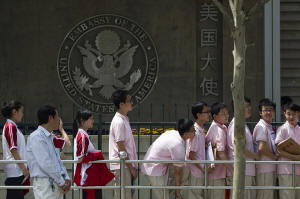New disputes emerge ahead of US-China trade talks in London
[June 09, 2025] By
KEN MORITSUGU
BEIJING (AP) — U.S.-China trade talks in London this week are expected
to take up a series of fresh disputes that have buffeted relations,
threatening a fragile truce over tariffs.
Both sides agreed in Geneva last month to a 90-day suspension of most of
the 100%-plus tariffs they had imposed on each other in an escalating
trade war that had sparked fears of recession.
Since then, the U.S. and China have exchanged angry words over advanced
semiconductors that power artificial intelligence, “rare earths” that
are vital to carmakers and other industries, and visas for Chinese
students at American universities.
President Donald Trump spoke at length with Chinese leader Xi Jinping by
phone last Thursday in an attempt to put relations back on track. Trump
announced on social media the next day that trade talks would be held on
Monday in London.
Technology is a major sticking point
The latest frictions began just a day after the May 12 announcement of
the Geneva agreement to “pause” tariffs for 90 days.
The U.S. Commerce Department issued guidance saying the use of Ascend AI
chips from Huawei, a leading Chinese tech company, could violate U.S.
export controls. That's because the chips were likely developed with
American technology despite restrictions on its export to China, the
guidance said.

The Chinese government wasn't pleased. One of its biggest beefs in
recent years has been over U.S. moves to limit the access of Chinese
companies to technology, and in particular to equipment and processes
needed to produce the most advanced semiconductors.
"The Chinese side urges the U.S. side to immediately correct its
erroneous practices,” a Commerce Ministry spokesperson said.
U.S. Commerce Secretary Howard Lutnick wasn't in Geneva but will join
the talks in London. Analysts say that suggests at least a willingness
on the U.S. side to hear out China's concerns on export controls.
China shows signs of easing up on rare earths
One area where China holds the upper hand is in the mining and
processing of rare earths. They are crucial for not only autos but also
a range of other products from robots to military equipment.
The Chinese government started requiring producers to obtain a license
to export seven rare earth elements in April. Resulting shortages sent
automakers worldwide into a tizzy. As stockpiles ran down, some worried
they would have to halt production.
[to top of second column] |

Chinese students wait outside the U.S. Embassy for their visa
application interviews, in Beijing on May 2, 2012. (AP
Photo/Alexander F. Yuan, File)
 Trump, without mentioning rare
earths specifically, took to social media to attack China.
“The bad news is that China, perhaps not surprisingly to some, HAS
TOTALLY VIOLATED ITS AGREEMENT WITH US,” Trump posted on May 30.
The Chinese government indicated Saturday that it is addressing the
concerns, which have come from European companies as well. A
Commerce Ministry statement said it had granted some approvals and
“will continue to strengthen the approval of applications that
comply with regulations.”
The scramble to resolve the rare earth issue shows that China has a
strong card to play if it wants to strike back against tariffs or
other measures.
Plan to revoke student visas adds to tensions
Student visas don't normally figure in trade talks, but a U.S.
announcement that it would begin revoking the visas of some Chinese
students has emerged as another thorn in the relationship.
China's Commerce Ministry raised the issue when asked last week
about the accusation that it had violated the consensus reached in
Geneva.
It replied that the U.S. had undermined the agreement by issuing
export control guidelines for AI chips, stopping the sale of chip
design software to China and saying it would revoke Chinese student
visas.
“The United States has unilaterally provoked new economic and trade
frictions,” the ministry said in a statement posted on its website.
U.S. Secretary of State Marco Rubio said in a May 28 statement that
the United States would “aggressively revoke visas for Chinese
students, including those with connections to the Chinese Communist
Party or studying in critical fields.”
More than 270,000 Chinese students studied in the U.S. in the
2023-24 academic year.
All contents © copyright 2025 Associated Press. All rights reserved
 |